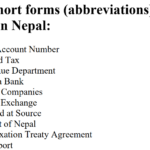The Company Registration Office: A Comprehensive Guide
The Company Registration Office (CRO) is a vital entity in any country’s economic framework, serving as the foundational body for the formalization and regulation of businesses. It is the first step for entrepreneurs and corporations alike when establishing their operations, ensuring that businesses are legally recognized and compliant with national regulations. In this article, we will explore the role of the Company Registration Office, its working area, the ministry under which it operates, its responsibilities, allied departments, and the overall importance of this institution in fostering economic growth.
1. Understanding the Company Registration Office
The Company Registration Office is the governmental agency responsible for the registration and regulation of companies within a country. Its primary function is to ensure that businesses operating within the nation are legally recognized, operate under the law, and adhere to national and international business standards. The CRO typically operates under the Ministry of Industry, Commerce, or a similar governmental department, depending on the country’s administrative structure.
1.1 Historical Background
The concept of a Company Registration Office dates back to the era of industrialization when governments recognized the need to regulate businesses to ensure economic stability and protect the interests of stakeholders. The establishment of a CRO marked a shift towards formalizing the business sector, encouraging transparency, and fostering a competitive market environment.
1.2 Legal Framework
The legal framework governing the CRO is usually encapsulated in a country’s Companies Act or similar legislation. This Act outlines the procedures for company registration, compliance requirements, and the powers vested in the CRO to enforce these regulations. The Act also defines the types of businesses that can be registered, including sole proprietorships, partnerships, limited liability companies (LLCs), and public limited companies (PLCs).
2. Working Area of the Company Registration Office
The working area of the Company Registration Office encompasses several key functions, each integral to the efficient regulation and monitoring of businesses. These functions include company registration, compliance monitoring, record maintenance, and providing information and support to the business community.
2.1 Company Registration
The most fundamental function of the CRO is the registration of companies. This process involves the submission of various documents, such as the company’s Memorandum of Association, Articles of Association, details of directors and shareholders, and proof of a registered office address. The CRO scrutinizes these documents to ensure they meet the legal requirements before issuing a Certificate of Incorporation, which officially recognizes the company as a legal entity.
2.2 Compliance Monitoring
Once a company is registered, the CRO is responsible for ensuring that it complies with ongoing legal obligations. This includes the timely submission of annual returns, financial statements, and any changes in the company’s structure, such as changes in directors or registered office addresses. The CRO has the authority to impose penalties on companies that fail to comply with these requirements, and in severe cases, may even initiate legal proceedings to strike off non-compliant companies from the register.
2.3 Record Maintenance
The CRO maintains an up-to-date register of all companies operating within its jurisdiction. This register is a public record, accessible to anyone seeking information about a particular company. The information stored includes the company’s name, registration number, date of incorporation, registered office address, details of directors and shareholders, and the company’s financial history. This transparency is crucial for maintaining trust in the business environment, as it allows stakeholders to make informed decisions based on accurate and reliable data.
2.4 Information and Support Services
In addition to its regulatory functions, the CRO also provides information and support services to the business community. This includes offering guidance on the registration process, compliance requirements, and the legal obligations of companies. The CRO may also provide educational resources, such as workshops and seminars, to help businesses navigate the complexities of company law and ensure they remain compliant with regulations.
3. The Ministry Overseeing the Company Registration Office
The Company Registration Office typically operates under the supervision of a governmental ministry responsible for commerce, industry, or economic development. This ministry plays a crucial role in shaping the policies and regulations that govern the registration and operation of companies, ensuring that they align with the broader economic goals of the country.
3.1 Role of the Ministry
The ministry overseeing the CRO is responsible for drafting and implementing the legislation that governs company registration and regulation. It works closely with the CRO to ensure that the regulatory framework is effective, up-to-date, and conducive to economic growth. The ministry also plays a key role in monitoring the performance of the CRO, ensuring that it operates efficiently and effectively in fulfilling its mandate.
3.2 Policy Development
One of the primary responsibilities of the ministry is to develop policies that promote a favorable business environment. This includes simplifying the company registration process, reducing bureaucratic red tape, and implementing reforms that encourage entrepreneurship and investment. The ministry may also introduce measures to enhance the transparency and accountability of businesses, such as stricter compliance requirements and penalties for non-compliance.
3.3 Coordination with Other Government Agencies
The ministry overseeing the CRO often collaborates with other government agencies, such as tax authorities, financial regulators, and trade and investment bodies. This coordination is essential for ensuring that companies comply with all relevant laws and regulations, and that there is a unified approach to business regulation across different sectors.
4. Allied Departments and Agencies
The Company Registration Office works closely with several allied departments and agencies, each playing a crucial role in the broader regulatory framework. These entities collaborate with the CRO to ensure that businesses operate legally and contribute to the country’s economic development.
4.1 Tax Authorities
Tax authorities are key allies of the CRO, as they are responsible for ensuring that companies meet their tax obligations. Upon registration, companies are typically required to obtain a tax identification number (TIN) and register for value-added tax (VAT) or goods and services tax (GST) if applicable. The CRO shares information with tax authorities to facilitate the efficient collection of taxes and to identify companies that may be evading their tax responsibilities.
4.2 Financial Regulators
Financial regulators oversee the financial sector, including banks, insurance companies, and securities markets. These regulators work with the CRO to ensure that companies operating in the financial sector comply with relevant regulations, such as capital adequacy requirements and anti-money laundering (AML) standards. The CRO may also share information with financial regulators to identify and monitor companies that pose a systemic risk to the financial system.
4.3 Trade and Investment Bodies
Trade and investment bodies, such as chambers of commerce and investment promotion agencies, play a vital role in supporting businesses and attracting foreign investment. These bodies often work with the CRO to provide information and support services to businesses, and to promote the country as a favorable destination for investment. They may also collaborate with the CRO to streamline the registration process for foreign investors and to ensure that they comply with local regulations.
4.4 Intellectual Property Offices
Intellectual property (IP) offices are responsible for the registration and protection of patents, trademarks, copyrights, and other forms of intellectual property. The CRO often collaborates with IP offices to ensure that companies register their intellectual property and protect their innovations. This collaboration is essential for fostering innovation and encouraging companies to invest in research and development.
5. Importance of the Company Registration Office
The Company Registration Office is a cornerstone of the formal economy, playing a crucial role in fostering economic growth, promoting transparency, and protecting the interests of stakeholders. Its importance cannot be overstated, as it ensures that businesses operate legally, contribute to the economy, and adhere to the highest standards of corporate governance.
5.1 Promoting Economic Growth
By facilitating the registration of businesses, the CRO plays a key role in promoting economic growth. Registered companies contribute to the economy through the creation of jobs, the production of goods and services, and the payment of taxes. The CRO’s efforts to streamline the registration process and reduce barriers to entry encourage entrepreneurship and investment, which are essential drivers of economic development.
5.2 Enhancing Transparency and Accountability
The CRO’s role in maintaining an up-to-date register of companies enhances transparency and accountability in the business environment. This transparency is crucial for building trust among stakeholders, including investors, creditors, and customers. By providing access to accurate and reliable information about companies, the CRO helps stakeholders make informed decisions and reduces the risk of fraud and other unethical practices.
5.3 Protecting Stakeholders’ Interests
The CRO’s regulatory functions, including compliance monitoring and enforcement, protect the interests of stakeholders by ensuring that companies operate legally and ethically. By imposing penalties on non-compliant companies and taking legal action against those that violate the law, the CRO helps to maintain a level playing field and promotes fair competition in the market.
5.4 Supporting Government Policy
The CRO plays a critical role in supporting government policy by ensuring that businesses comply with national and international regulations. This compliance is essential for the country’s reputation in the global market and for attracting foreign investment. The CRO’s efforts to promote good corporate governance and ethical business practices also contribute to the country’s overall economic stability and development.
6. Challenges and Future Outlook
While the Company Registration Office plays a vital role in the economy, it also faces several challenges that need to be addressed to ensure its continued effectiveness.
6.1 Bureaucratic Red Tape
One of the most common challenges faced by the CRO is bureaucratic red tape, which can slow down the registration process and discourage entrepreneurship. To address this issue, many countries are implementing reforms to simplify the registration process, reduce paperwork, and introduce online registration systems.
6.2 Compliance and Enforcement
Ensuring compliance with company law is another significant challenge for the CRO. Non-compliance can result in financial losses for stakeholders and damage to the country’s reputation. To improve compliance, the CRO may need to enhance its enforcement capabilities, introduce stricter penalties for non-compliance, and increase its collaboration with other regulatory agencies.
6.3 Technological Advancements
The rapid advancement of technology presents both opportunities and challenges for the CRO. On one hand, technology can streamline the registration process, improve record-keeping, and enhance the transparency.
On one hand, technology can streamline the registration process, improve record-keeping, and enhance the transparency of company information. On the other hand, the CRO must ensure that its systems are secure, user-friendly, and capable of handling large volumes of data. The adoption of new technologies, such as blockchain, artificial intelligence (AI), and big data analytics, presents opportunities to improve the efficiency and accuracy of the CRO’s operations. For instance, blockchain can be used to create tamper-proof records of company information, while AI can be employed to detect and prevent fraudulent activities. However, the implementation of these technologies requires significant investment and expertise, and the CRO must work closely with IT professionals to ensure their successful deployment.
6.4 Globalization and Cross-Border Regulation
As businesses increasingly operate on a global scale, the CRO faces the challenge of regulating companies that have operations in multiple jurisdictions. This requires close collaboration with regulatory bodies in other countries to ensure that companies comply with international standards and that there is consistency in the enforcement of regulations across borders. The CRO must also stay informed about global trends and developments in company law and be prepared to adapt its regulatory framework to meet the changing needs of the business environment.
6.5 Capacity Building and Training
To effectively carry out its functions, the CRO must ensure that its staff are well-trained and equipped with the necessary skills and knowledge. This includes providing ongoing professional development opportunities, such as training in the latest regulatory practices and technological advancements. The CRO may also need to increase its staffing levels to cope with the growing number of companies being registered and the increasing complexity of the regulatory environment.
The Company Registration Office is a crucial institution in the economic landscape, responsible for the formalization and regulation of businesses. It plays a key role in promoting economic growth, enhancing transparency and accountability, protecting stakeholders’ interests, and supporting government policy. Despite the challenges it faces, the CRO’s continued effectiveness is essential for maintaining a stable and competitive business environment. By embracing technological advancements, simplifying bureaucratic processes, and enhancing its enforcement capabilities, the CRO can continue to fulfill its mandate and contribute to the overall economic development of the country.
The Company Registration Office is not just a regulatory body, but a vital cog in the economic engine of any nation. Its role in ensuring that businesses operate legally, ethically, and transparently cannot be overstated. As the global business environment continues to evolve, the CRO must remain agile and adaptive, ready to meet the challenges of the future while continuing to support the growth and success of businesses within its jurisdiction.
Location: Tripureshwor, Kathmandu, Nepal
Google Maps Click here
Phone: +977-1-4259948, +977-1-4263089
Fax: +977-1-4259961
Information Technology Helpdesk: +977-1-5363090, +977-1-5359961
Email: info@ocr.gov.np
Online Company Registration (ocr.gov.np) Click here
Office time 10 am to 5pm NST business days i.e, Sunday to Friday (Saturday is weekend in Nepal). See Nepali calendar for holiday click here.



